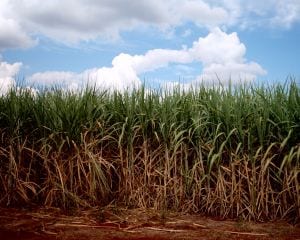
Brazilís Biofuel Revolution: Power of Sugarcane
Brazil found a sustainable energy source from its abundant sugarcane plantations
Decades before a massive oil discovery off the coast of Rio de Janeiro, Brazil turned its attention to the power of sugarcane. Today the developing nation consumes more ethanol than petroleum. Thunderbird School of Global Management Professor John Zerio, Ph.D., led a group of MBA students to Brazil in January 2011 to see the biofuel revolution firsthand. This five-part Brazil Winterim series follows the students on their journey to the plantations, mills and research centers driving alternative fuel innovation.
Power of Sugarcane
Brazilians had a joke about their over-reliance on foreign oil during the 1970s global energy crisis. Venezuela and Argentina, their neighbors to the north and south, both had oil. Brazil just needed to find the elusive pipeline connecting the countries.
“It was a joke for 30 years,” Thunderbird Professor John Zerio, Ph.D., tells his students in Sao Paulo on the opening day of a three-week Winterim course on sustainability. “But Brazil never found huge amounts of oil, and it was the best thing that ever happened.”
Left with few options, the emerging market looked inward and found a sustainable energy source on the abundant sugarcane plantations that Portuguese settlers first commercialized in the 1500s.
Decades before other countries started thinking about ethanol, Brazil launched a biofuel revolution using the power of sugarcane in ways the early colonists never imagined. The ethanol movement has taken hold since then like nowhere else on the planet.
“Ethanol is embedded in the DNA of this country,” says Zerio, a Brazilian native from Sao Paulo. “People here are proud of their sugarcane and the sustainability it represents.”
Nearly half of Brazilian vehicles operating in 2011 include flexible fuel engines optimized to run on 100 percent ethanol or any mix of gasoline. Every service station in the country sells domestic ethanol side-by-side with other fuels, and regular gasoline includes 25 percent ethanol.
The programs have produced dramatic results. Brazil’s National Petroleum Agency estimates that the country’s ethanol consumption surpassed that of gasoline in the second half of 2008.
Brazil also produces electricity and other products from sugarcane without jeopardizing the country’s status as the world’s No. 1 exporter of granulated sugar. The alternate energy source means Brazilians have options when oil prices surge — like they have in 2011 — or when sugar prices fluctuate.
Brazil carved out the energy niche without waiting for a pipeline discovery between Venezuela and Argentina. But the joke took a twist in 2007 when Brazilian state oil company Petrobras announced a massive find off the coast of Rio de Janeiro that could turn the country into a major oil exporter within 10 years.
Zerio smiles at the timing of the discovery. “Brazil created an industry that is not so much oil dependent,” he says. “And now they found oil.”
He says his countrymen sometimes joke that God is Brazilian, and maybe they are right. “God let the Brazilians suffer a lot until they got their act together, and then he let them find oil,” Zerio says. “Things couldn’t be better.”
[This article has been reproduced with permission from Knowledge Network, the online thought leadership platform for Thunderbird School of Global Management https://thunderbird.asu.edu/knowledge-network/]





